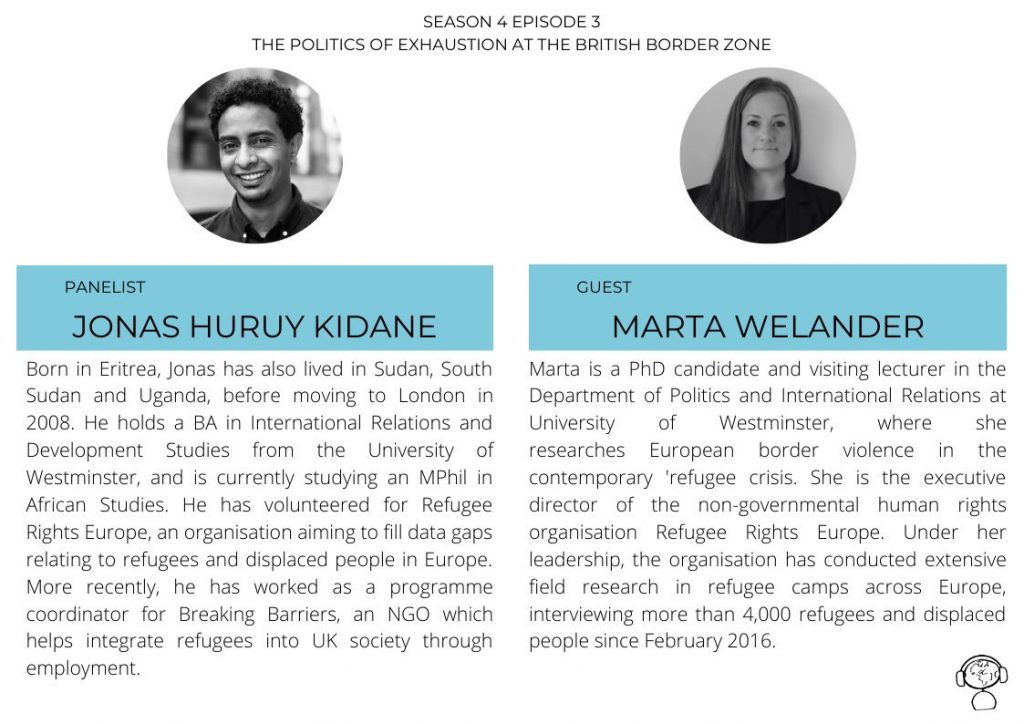This episode focuses on the UK’s policy of deterring refugees and migrants from seeking asylum by extending the Home Office’s domestic “hostile environment” beyond state borders and into mainland Europe. We investigate the ethical and legal aspects of these policies and their implications on the lives of refugees across Europe.
In line with the Home Office migration policies set out in 2012, the UK government has pledged to stop ‘onward movement’ of migrants who attempt to leave their first save country of arrival in order to find a better life for themselves in another. This strategy, which Theresa May laid down in her 2016 Speech at the first ever UN summit on mass movement of refugees, has become an all-too familiar British policy line, with disastrous consequences. The UK has since mobilised vast amounts of resources to pre-emptively stop refugees from crossing its borders, including funding for a border wall in Calais and a further £6 million towards security equipment and coastal monitoring.
‘Women, children, sick… there are families with children here… That poor woman with a 3 or 4-year-old child, how can they tolerate this? We have people here who have a broken leg, who have a cold or don’t feel well and can’t walk…they will freeze from the cold. Illness, sickness…’.
Source: Welander, M. (2019) The Politics of Exhaustion and the British Sea Crossings Spectacle
It is important to consider these policies in light of the larger migration question within Britain. The drastic measures taken combined with a dehumanising rhetoric around refugees posit immigration as a major factor shaping politics and the lives of British citizens. However, 84% of the worlds’ refugees are accommodated by poor and middle-income countries, most of which are located in the Global South. At the forefront of the migration debate are thus the minority 16% of refugees, of which the UK shares a tiny fraction compared to Italy or Germany. Furthermore, it is important to keep in mind that British migration policies are highly porous, creating what are effectively open borders for highly skilled workers while excluding those with few or no skills. This ignores the reality that the UK is highly dependent on low-skilled workers for economic, social and not least demographic reasons.
The podcast gives insight into the situation of the Calais and Dunkirk refugee camps, where daily violence has become the reality for many people. Facing sustained intimidation and violence by the state authorities, the camps’ inhabitants are sleeping rough and are facing mental health problems while being exposed to the horrific physical conditions of the winter months. Marta’s research on the refugees’ situation led her to coin the term ‘Politics of Exhaustion’, which encompasses both the British border policy and its devastating consequences.
“the politics of exhaustion can be understood as a complex deterrence approach with the objective of exhausting asylum seekers, mentally and physically, with the ultimate goal of deterring them from approaching Britain for asylum, or indeed other European asylum systems”
The podcast delves into the myriad forms of structural and physical violence that take place in the British ‘border zone’. Most of these are covert forms but others are highly visible, combining physical dispersals and push-backs, arbitrary detention and removals, evictions and demolitions. In the episode, Marta outlines the work of Refugee Rights Europe, the NGO she set up in response to the wide-ranging human rights violations of refugees seeking security in Europe. She highlights how the Politics of Exhaustion also play out against NGOs, through increasing intimidation of aid volunteer as well as the obstruction of the (already extremely limited) inflow of aid.
“The most subtle forms of violence and neglect and intimidation, they all contribute to this really heightened sense of exhaustion that people keep exerting, keep using their agency to try and find a solution to their predicament but being constantly pushed back”
– Marta Welander

Links for further information:
- Marta Welanders’ Blog on the Politics of Exhaustion: https://www.law.ox.ac.uk/research-subject-groups/centre-criminology/centreborder-criminologies/blog/2019/01/politics
- On Asylum in the UK: https://www.unhcr.org/uk/asylum-in-the-uk.html
- Global Trends: Forced Displacement in 2016 https://www.unhcr.org/5943e8a34
- Stephen Castles on Open Bordes: https://www.opendemocracy.net/en/article_1657jsp/
